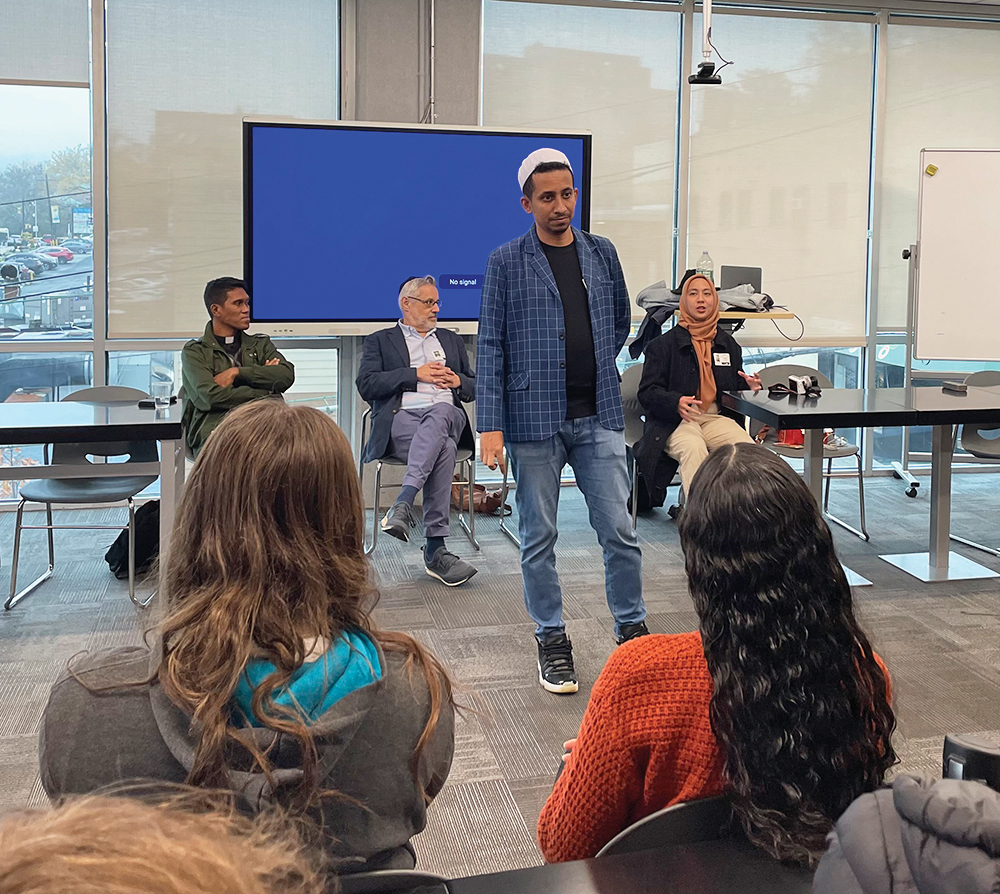
Last week SAR was visited by a cohort from the “1,000 Abrahamic Circles Project.” This group brings together a Jewish, Muslim and Christian leader from a wide range of worldviews to spend three weeks together, living in each of their communities, directly observing each other’s way of life, and meeting their co-religionists. We had booked this panel to speak to my “Jewish Encounters with Other Faiths” class in September. I debated whether we should cancel. How could we invite a diverse group of religious leaders into our community when we are in such terrible pain, when we feel so vulnerable and disappointed in the worldwide response to our suffering? How could we introduce speakers whose voices we do not know, whose opinions we likely would not share, and whose lives are so radically different from our own?
At a time when it is no joke for an imam, priest and rabbi to walk into any kind of space together we did not cancel, because they did not cancel. Day 1 of their fellowship was October 8, and they pressed on. Their program policy is not to discuss politics. And so our students met an imam from Indonesia, a priest from East Timor in Southeast Asia and a rabbi who lives in New York. On the day of the panel I was anxious. I met with our school’s security to let them know this was happening; I did not want our visitors to arouse suspicion. Before the panel, I took the group on a tour of the school, to explain how our building’s architecture ensures that our beit midrash, the beating heart of our school, is visible from every floor. As we walked all around, I became acutely aware of the large number of Israeli flags hanging from every floor, and how every TV monitor throughout the building displayed the prayer for our soldiers as well as pictures of our principals with alumni currently serving in the IDF. I feel so much pride whenever I walk by these images, and this time I also felt nervous about the reactions of those accustomed to seeing Israeli flags in a negative context. I searched for discomfort or alarm in their eyes but found none. The group was excited to learn, to take it all in.
During the panel the presenters shared how much they enjoyed spending time in one another’s communities and how much they learned. They shared stories of unity, empathy and kindness. They made us laugh. No one said anything unexpected of an interfaith initiative; no earth was shattered or revelations conveyed. No one argued or yelled. We sat and we listened. We had our stereotypes challenged as we acknowledged the diversity within each religious community. At a time when it is easy to argue that nuance should be shelved, we embraced the complexity. In a time when we are tempted to insulate ourselves, we opened our doors to others. In a time of war, we practiced humility, hospitality and respect. We tried, in the words of Rabbi Abraham Joshua Heschel, “To search in the wilderness for well-springs of devotion, for treasures of stillness, for the power of love and care for man…to cooperate in trying to bring about a resurrection of sensitivity, a revival of conscience; to keep alive the divine sparks in our souls…” In a time of darkness, our search to find our common humanity was a source of warmth and light. It showed me and our students that we are not alone.










